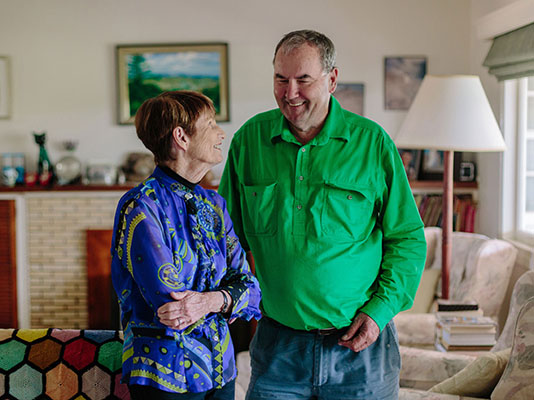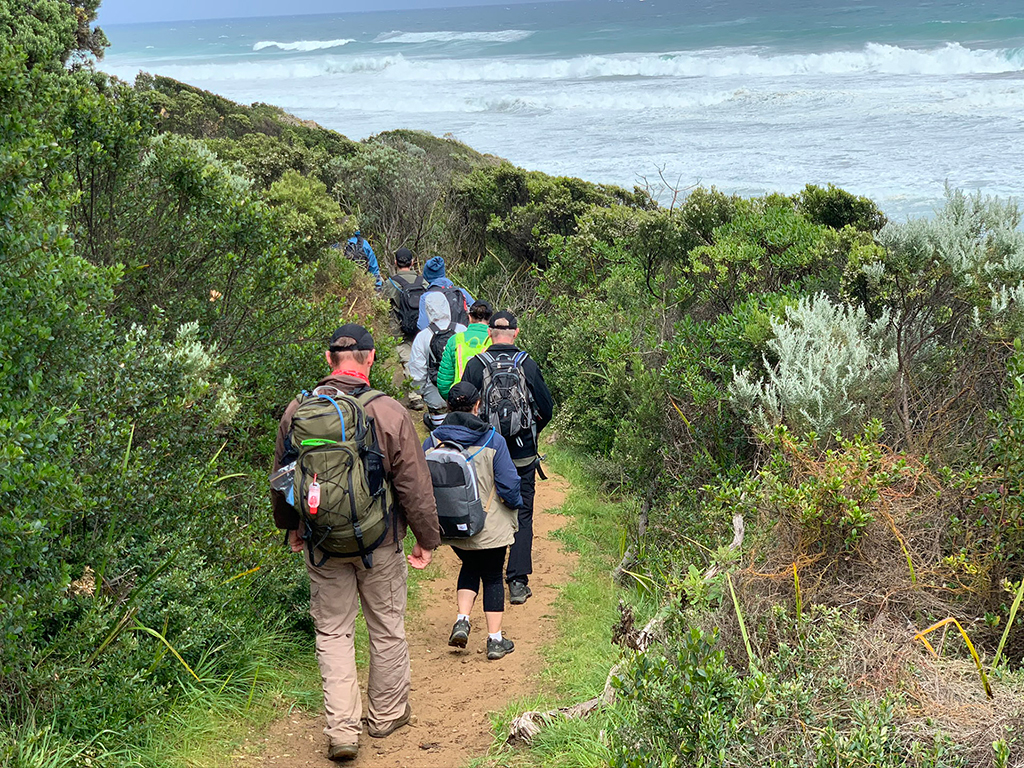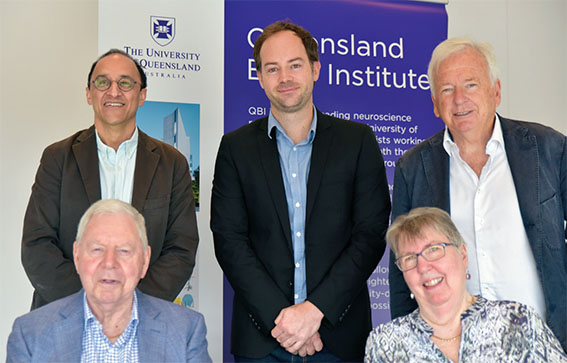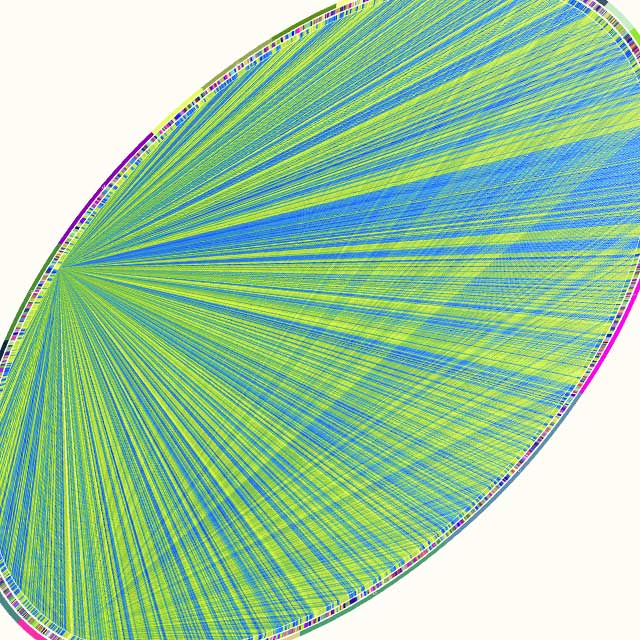The diseases we research impact people's lives
Our researchers are dedicated to improving lives through neuroscience. Thanks to the generosity of all our donors, that we can continue our legacy of ground-breaking research.
Brazil Family Foundation

Recognising stroke and motor neurone disease (MND) had only limited treatment options and no cures prompted Lyn and Bobbie Brazil to establish the Brazil Family Program for Neurology in 2017. This enabled us to recruit world-leading researchers and support four laboratories.
Dr Adam Walker’s laboratory has defined some of the early triggers of MND to enable the best targeted approaches for therapies and identified ways to prevent the abnormal accumulation or improve the removal of a protein that causes motor neurons to die.
Dr Tara Walker is examining whether the dietary supplement selenium can prevent or decrease cognitive or motor deficits following stroke.
Dr Matilde Balbi aims to understand how stimulating the cortex in different ways reduces the loss of brain cells after a stroke and whether this mitigates behavioural deficits.
Professor Gail Robinson’s stroke research aims to improve cognitive assessment tests used to evaluate stroke survivors, in the acute phase, to predict long-term outcomes and to develop more targeted, personalised therapy strategies. Professor Robinson also aims to improve our understanding of the biological basis of MND.
The Brazil Family have also donated generously to our Alzheimer’s disease research. This gift contributed to Professor Jürgen Götz and his team’s ground-breaking therapeutic ultrasound approach to target dementia. This research has identified a range of potential applications for ultrasound, including delivering drugs into the brain. The intention is to modify disease progression and ultimately cure brain diseases.
Discovery research leads to the health outcomes of the future, but it takes time and support. Researchers need preliminary data to support their applications for grants. With government grant funding becoming harder to secure , scientists with promising research potential are being lost.
Funding of researchers who narrowly miss out on government grant funding could hold the key to major breakthroughs and, with support, could continue to explore new avenues and build the data needed to be successful in subsequent grant rounds.
The Brazil Family Foundation understands the power of “near-miss” applications and are supporting our scientists with a gift which enables them to continue collecting valuable data to improve their grant success in future funding rounds.
The whole of the QBI community pays tribute to the Brazil Family Foundation whose generosity and support enables us to continue our pathway to expanding our understanding of the brain, the underlying causes of brain disease and help develop new treatments which will benefit the community at large.

Great Ocean Walk, raised over $125 000 to support
brain research.
NFIA Trekkers do the hard yards for QBI
Through the hard work of Brian Davies, a successful businessman and immediate past-president and patron of the National Fire Industry Association (NFIA), and his wife, Liz, QBI was the joint-recipient of a donation of over $250 000 in 2019.
This incredible effort was the result of the NFIA Patron’s Walk held in October, which may sound like a scenic walk in the park but Brian, Liz and seven other NFIA members spent three days enduring driving rain and winds of close to 50 knots coming straight from Antarctica.
The idea for the walk came while the couple were completing the Three Capes Walk to raise money for the Queensland Brain Institute in 2018.
On that walk, Liz suggested to Brian that as the patron of the NFIA, he could create his own walk for charity. Mr Davies believes that corporate Australia has a big responsibility to give back, which is testament to the success of the inaugural walk. The money raised was shared between the Queensland Brain Institute and the Gallipoli Medical Research Foundation (GMRF).
The NFIA walk is the first of three walks to raise money for research at QBI and GMRF, with the aim of raising $500 000 in three years. The donation from the NFIA walk will help QBI’s research into motor neurone disease, dementia, Parkinson’s disease, stroke and QBI’s Discovery Research Endowment fund, which enables fundamental research into major health issues, including depression, anxiety, PTSD and epilepsy. QBI is extremely grateful to Brian and Liz and the NFIA team for their support.
The NFIA walk is the first of three walks to raise money for research at QBI and GMRF, with the aim of raising $500 000 in three years.
The Stafford Fox Medical Research Foundation

(QBI Director) and Dr Steven Zuryn and Emeritus Professor Perry Bartlett AO (back row).
In 2019, The Stafford Fox Medical Research Foundation confirmed its continued generous support of the prestigious $2.5 million philanthropically funded international fellowship to Dr Steven Zuryn at the Queensland Brain Institute to fight stroke-induced dementia, also known as vascular dementia. The Foundation also continues to support the work of Emeritus Professor Perry Bartlett’s research into prevention of dementia in ageing by improving cognition through exercise.
The Stafford Fox Medical Research Foundation was established in 2013 following the death of Moyna Fox, and named in honour of her late husband, James Stafford Fox, a former BP Australia chief executive.
Stafford and Moyna Fox started one of Australia’s wealthiest medical research foundations after many years of careful planning, resulting in a fund worth over $100 million. It was only publicly revealed in Moyna’s will when she died in 2013, many years after her husband.
James Stafford Fox was a private person, tall, physically imposing, but without a, particularly dominant personality. He rose from a position as a junior clerk at the Port Melbourne depot of the Commonwealth Oil Refineries (COR) in 1932, to become the first Australian chief executive of BP Australia Ltd in 1971.
James Stafford Fox spent three years at the helm of BP Australia, and retired in 1974 at age 60, remaining on several boards until 1985. By 1990, he was in poor health, suffering, among other things, from dementia. He entered a nursing home and died in 1994. By that time, he had already charted the course that would lead to the establishment of the foundation. Moyna lived on for more than 18 years, knowing what would happen after her death, but never revealing it publicly. Eventually, she too succumbed to dementia and died in 2013. The couple, who were so careful with their money and who clearly had no desire for fame and prominence during their lifetime, will now forever be remembered for their generosity in setting up the Stafford Fox Medical Foundation.
The Foundation’s support of QBI is crucial in enabling Emeritus Professor Bartlett and Dr Steven Zuryn to continue their work in finding solutions for the growing challenge of dementia today. This cutting- edge research is helping put Queensland and Australia at the forefront of world medical research.
What your donations fund
Your support can help us achieve a range of achievements

World leading research

Brightest scientific minds

Solutions to global health challenges
"I think it is important for people with dementia, their families and carers, to know that they are not forgotten, and that there’s a lot of work going on behind the scenes at QBI to try to unravel the tangled web that is dementia."
– Robyn Hilton (established the Peter Hilton Senior Research Fellowship in Ageing Dementia)
Hear from one of our supporters
Jeff Maclean, Chair of QBI Advisory Board
Got a story you would like to share?
Are you a donor or supporter of QBI and would like to share your story? We would love to hear from you!
Research in action
Adjunct, affiliate and honorary
Mr John Kelly
Researcher profile is public:0Supervisor:Ms Jessica McFadyen
PhD StudentQueensland Brain InstituteResearcher profile is public:0Supervisor:Ms Alice Petty
PhD StudentQueensland Brain InsituteAdjunct Research FellowQueensland Brain InstituteResearcher profile is public:0Supervisor:Dr Hannah Filmer
Researcher profile is public:1Supervisor:Professor Grant Montgomery
Researcher profile is public:1Supervisor:Researcher biography:Professor Grant Montgomery FAHMS FSRB Hon FRSNZ
Professor Montgomery was born in New Zealand, completed PhD studies in Animal Science at Massey University and post-doctoral research in France. In 1987, he co-founded the New Zealand Sheep Genomics Program in the Biochemistry Department at the University of Otago and pioneered the introduction of genome mapping methods in farm animals. He moved to Australia in 1999 and joined the Queensland Institute of Medical Research where he ran a successful genome mapping program for human complex disease. In 2016, he moved to the University of Queensland and holds joint appointments at the Institute for Molecular Bioscience (IMB) and the Queensland Brain Institute (QBI). He is a National Health and Medical Research Council Leadership Fellow and Director of the UQ Genome Innovation Hub. He was elected a Fellow the Society for Reproductive Biology in 2012, Fellow of the Australian Academy of Health and Medical Sciences in 2015, and Honorary Fellow of the Royal Society of New Zealand in 2016. His research focusses on discovery of critical genes and pathways increasing risk for common diseases especially reproductive diseases including endometriosis.
Associate Professor Shyuan Ngo
Scott Sullivan Research Fellow in MNDQueensland Brain InstituteResearcher profile is public:1Supervisor:Researcher biography:I completed my undergraduate and PhD training at UQ. After completing my PhD in 2009, I took up a postdoctoral position at UQCCR to introduce a translational edge to my research program. In 2012, I was awarded a Bill Gole Postdoctoral Research Fellowship from the Motor Neurone Disease Research Institute of Australia (MNDRIA) and returned to the School of Biomedical Sciences with this fellowship to continue my research program in motor neuron disease (MND). In 2015, I was awarded the Scott Sullivan MND Research Fellowship. In this position, I conduct research between the Australian Institute for Bioengineering and Nanotechnology and the Queensland Brain Institute at UQ, and the Royal Brisbane and Women's Hospital and the Wesley Hospital to address how changes in energy metabolism affects the course of MND, whilst working to develop therapies for MND.
The primary interest of my research group is to understand how metabolic homeostasis at the systemic and cellular level can impact upon neurodegenerative processes. My group's Metabolic Exploration in Neurodegenerative Disease (MEND) research program centres on Motor Neurone Disease (MND), a fatal neurological condition in which the average life expectancy is 27 months following diagnosis. In MND, the irreversible degeneration of neurones in the central nervous system leads to progressive paralysis and eventually, death. There is no effective treatment for MND, and hence no cure. We are using mouse models of MND, and human myosatellite cell-derived muscle fibres and human induced pluripotent stem cell (iPSC)-derived neurons to not only understand the mechanistic nature of MND, but to also conduct preclinical testing of potential therapeutic compounds. The combined use of mouse and human-derived models are integral to our goal of translating research findings into clinical trials for MND.
Associate Professor Martin Sale
Associate Professor in PhysiotherapySchool of Health and Rehabilitation Sciences, UQResearcher profile is public:1Supervisor:Researcher biography:The human nervous system is no longer thought of has hard-wired, and is in fact capable of rapid change throughout life. This plasticity is important for learning, memory and recovery from brain injury. I am interested in using emerging brain stimulation and imaging techniques to "artificially" induce plasticity in the human brain, to ultimately improve the treatment outcomes for various neurological conditions, particularly stroke. These stimulation techniques include transcranial magnetic stimulation (TMS) and transcranial direct current stimulation (tDCS).
I completed a BSc in 1994 and received a First Class Honours in Physiology in 1995 from the University of Adelaide. I then completed a Bachelor of Physiotherapy Degree at the University of South Australia. Returning to research in 2005, I undertook a PhD at the University of Adelaide, which I completed in 2009. My doctoral studies focussed on a new and exciting area of neuroscience – neuroplasticity. At the time of commencing my PhD, it was becoming clear that various non-invasive brain stimulation techniques (such as TMS) were able to temporarily reorganise the circuitry in the human brain in a similar way to what happens when we learn something new or store a memory. I was interested in trying to understand why some people responded to these stimulation paradigms, and others didn't. What I discovered was that it an important driver of plasticity in humans was when the stimulation was delivered. In effect, the brain seemed to learn better at night time compared to the morning. This has important clinical implications, as it suggests that rehabilitation might be more effective at a certain time of day.
I was awarded a University of Queensland Postdoctoral Fellowship in 2010, and then a NH&MRC Postdoctoral Research Fellowship in 2011 to investigate more intensely how the brains of stroke patients rewire. I am using state-of-the-art stimulation and imaging techniques such as TMS, magnetic resonance imaging (MRI) and electroencephalography (EEG) to understand how the brain reorganises when it stores information, and how we can boost this process.
I am currently an Associate Professor and Head of Physiotherapy within the School of Health and Rehabilitation Sciences at UQ. I head my own brain stimulation and imaging laboratory, and am conducting experiments in the following areas:
a) investigating the link between brain oscillations, sleep, plasticity and ageing;
b) improving hazard perception with brain sitmulation;
c) identifying factors that improve neuroplasticity induction in health and disease.
Professor Naomi Wray
Affiliate NHMRC Leadership FellowQueensland Brain InstituteResearcher profile is public:1Supervisor:Researcher biography:Naomi Wray is the Michael Davys Professor in the Department of Psychiatry, University of Oxford. She holds an appointment at the Institute for Molecular Bioscience (IMB) within the University of Queensland. She joined UQ Queensland Brain Institute in 2011 moving to the IMB in 2015. She was Head of the Centre for Population & Disease Genomics within IMB 2018-2023. Her Oxford appointment started in 2023.
Her research focuses on development and application of quantitative genetics and genomics methodologies across complex diseases, disorders and traits, but particularly psychiatric-related traits.
She is a National Health and Medical Research Council (NHMRC) Leadership Fellow, a Fellow of the Australian Academy of Science and a Fellow of the Australian Academy of Health and Medical Science. In 2020 she was awarded the NHMRC Elizabeth Blackburn Award for Leadership in Basic Science and the 2021 International Society of Psychiatric Genetics Ming Tsuang Lifetime Achievement Award. She is a Clarivate Highly Cited researcher.
She was Director of the Program in Complex Trait Genomics (PCTG) funded as an NHMRC Program Grant 2017-2022. She plays a key role in the International Psychiatric Genomics Consortium and established the sporadic ALS Australia systems genomics consortium (SALSA) funded by the MND Research Australia IceBucket Challenge and FightMND. She is a co-investigator on the Australian Genetics of Depression Study (AGDS) and is currently launching the AGDS-Cello project focussed on establishing a cell line resource from participants with a detailed history of anti-depressant use and response measures. She is part of an NHMRC Synergy (2023-2027) "Rhythms and blues: Personalising care for body clock dysfunction in mood disorders".
She is secretary of the International Society of Psychiatric Genetics, and is on the editorial advisory boards of JAMA Psychiatry, Neuron, Royal Society Open and Research Directions: Depression.
Body: Professor Naomi Wray: Program in complex trait genomics
Professor Naomi Wray: Program in complex trait genomicsThe Wray laboratory focusses on understanding the genetic contribution to psychiatric and neurological disorders. The group specialises in applying new analytical methods of genomic data to provide insights into these complex disorders, with an ultimate goal to improve diagnosis, prognosis and treatments. The lab plays a key role in the international Psychiatric Genomics Consortium and Prof Wray co-leads the sporadic ALS Australia systems genomics consortium (SALSA), funded by the IceBucket Challenge.
Dr Xiaoying Cui
Honorary Research FellowQueensland Brain InstituteResearcher profile is public:0Supervisor:Mr Tim Edwards
PhD StudentQueensland Brain InsituteResearcher profile is public:0Supervisor:Dr Amir Fazlollahi
Research FellowQueensland Brain InstituteResearcher profile is public:1Supervisor:

